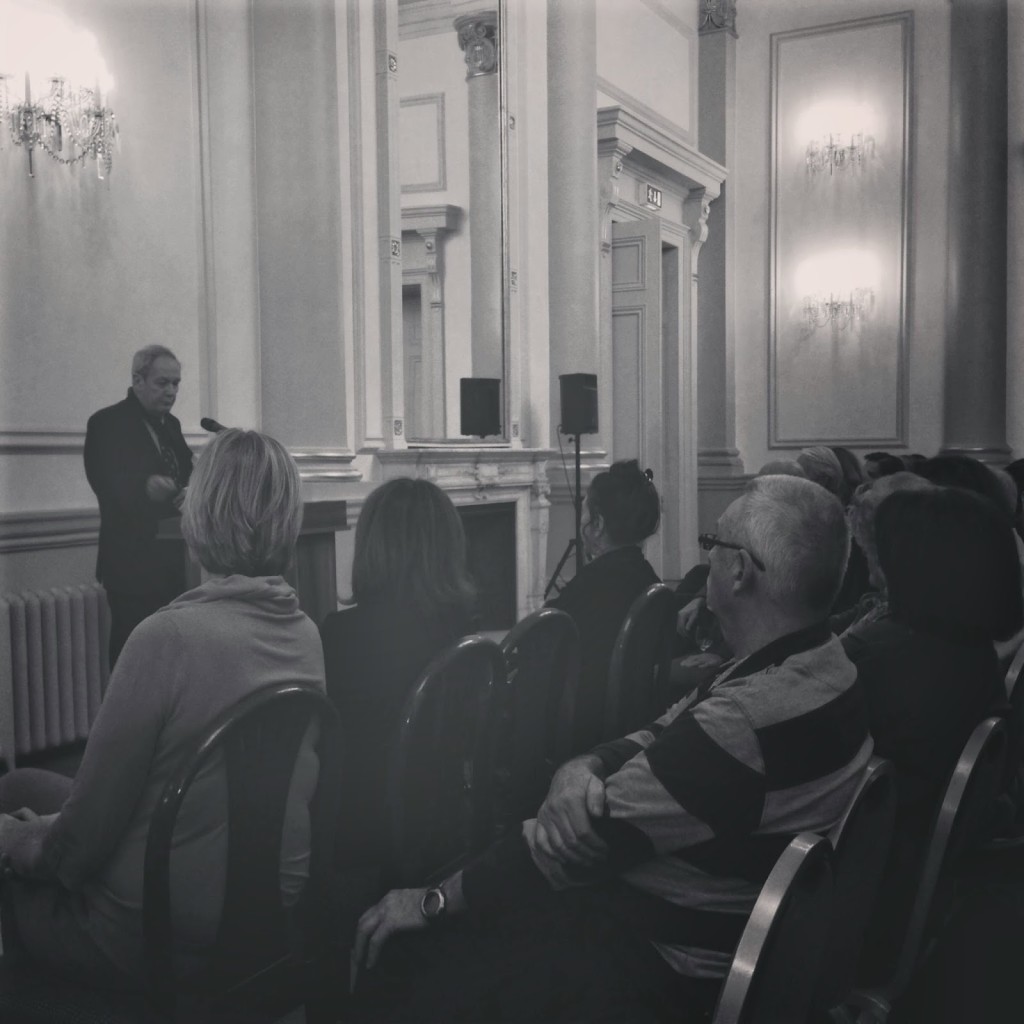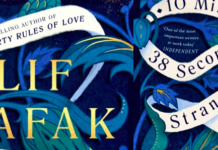 Monday 17 February saw the glamorous ballroom of the British Consulate General transformed into the setting for a historical lecture. Steeped in history, the room was a sight to behold with its enormous crystal chandeliers said to have been sent as a gift from Queen Victoria to the Russian Tsars. While being transported to the Black Sea via the Bosphorus, the Crimean War broke out, leaving these magnificent nineteenth century marvels in Istanbul; three of which can be found in the Consulate, with the fourth and grandest of the lot adorning the ceiling of Dolmabahçe Palace. As a recent graduate of Russian history I found myself near frothing at the mouth after hearing this piece of nineteenth century trivia!
Monday 17 February saw the glamorous ballroom of the British Consulate General transformed into the setting for a historical lecture. Steeped in history, the room was a sight to behold with its enormous crystal chandeliers said to have been sent as a gift from Queen Victoria to the Russian Tsars. While being transported to the Black Sea via the Bosphorus, the Crimean War broke out, leaving these magnificent nineteenth century marvels in Istanbul; three of which can be found in the Consulate, with the fourth and grandest of the lot adorning the ceiling of Dolmabahçe Palace. As a recent graduate of Russian history I found myself near frothing at the mouth after hearing this piece of nineteenth century trivia!
Many people will have seen the imposing structure of the British Consulate, located just off Istiklal Caddesi. The current building was built in the 1840s and was designed by Sir Charles Barry, the same architect behind the Houses of Parliament in London. The tragic bombing of 2003 has rendered the consulate an intriguing dichotomy of nineteenth century architectural prowess and twenty-first century ultra-modern security. This setting felt particularly appropriate as the lecture was entitled “England and the First World War in the Middle East”, a subject rooted in colonial Britain and still wholly relevant today with the on-going crises in Iraq and Syria. It’s interesting to note the title used the word ‘England’ and not the ‘United Kingdom’, a point made all the more ironic because of Norman Stone’s Scottish heritage!
The lecture was the first in a series of four Crimean Memorial Lectures, the proceeds of which will be split between the St George’s, the Crimean Memorial Church’s refugee hostel, which provides a refuge to victims of conflict, and the BCC (UK branch) pension fund, which supports pensioners who have fallen on hard times and street children education programmes, amongst other charitable activities. The next lecture will be on Monday 3 March at 7pm and is by James Alexander on ‘TS Eliot and the Poetry of War’. The third one is on Monday 14 April and is by Sean McMeekin on ‘July 1914: Countdown to War’, and the fourth and final one will take place on Friday 23 June and is by Philip Mansel and will be covering ‘From Mehmed II to World War I: The Ottoman Empire and Europe’. Information regarding ticket purchase can be found at the Crimean Church Lectures website.
Stone began his lecture discussing the role played by the Italo-Turkish War, which lasted from September 29 1911 until October 18 1912, in the outbreak of the First World War. The conflict saw the Ottoman lands in modern day Libya and the Dodecanese islands seceded to Italy. The ease with which Italy was able to defeat the Ottomans stoked the embers of Balkan nationalism, leading to the First Balkan War, in which the majority of the Ottoman Empire’s European territories were divided among Serbia, Greece, Bulgaria, Montenegro, and the newly formed Albanian state.
The vagueness of the Treaty of London, which ended this conflict, in turn led to the Second Balkan War, which saw the rise in power of Serbia. Regional political aims of the Great Powers of Britain, Germany, Russia, France, and the Austro-Hungarian Empire created the polarisation of Europe that triggered the outbreak of the First World War after the assassination of Archduke Franz Ferdinand. These two sentences do little justice to the complex geopolitical ambitions and fears of the countries that prompted the outbreak of the First World War, and I can only apologise for that as this subject in itself warrants much deeper analysis!
What it does achieve however is bringing our timeline forward to 1915. One of the Allied powers, Russia, had long held ambitions to secure their warm-water naval bases in the Black Sea, and the only route took them through the Bosphorus and Dardanelles straits, held by one of the Central powers, the Ottoman Empire. With the futility of trench warfare leading to stagnation on the western front, Britain, the Commonwealth – Australia and New Zealand in particular – and France launched an operation against the Ottomans to secure the Dardanelles strait known as the Gallipoli Campaign.
Anyone who has made the trip to Ҫanakkale to visit the Allied and Turkish cemeteries will have seen the extraordinarily formidable and impossible task posed by the geographical location alone. According to Norman Stone this didn’t even pose the biggest threat, with the sheer extent of Allied unpreparedness for the campaign providing the killer blow for the failure of the military operation. Fresh water supplies were scarce as they had to be brought in from the neighbouring island of Lemnos under the cover of darkness. This lack of clean water meant sickness and disease was strife, with dysentery particularly widespread. It was said that of the 150,000 soldiers that landed only 70,000 were fighting fit, with the remainder suffering from dysentery.
Questions have long been raised as to why so little planning seems to have gone into the campaign. Stone contends that only two people in London saw the operation as a mistake during its planning process, including a colonel who was the military console in Adana in 1899, who would arguably have had far better knowledge of the region than the other politicians and military strategists who planned the campaign.
Stone sees this fatal stroke of hubris as endemic in the twilight era of the colonial British Empire, an over-confidence that was also evident during the Mesopotamian campaign in Baghdad and on the Palestinian front where mosquito nets were deemed unnecessary so the treasury could save a few extra pounds. Extending beyond the walls of parliament, Stone contends that this over-confidence was prevalent throughout the entire leadership of the Allied powers. He eloquently described his view of Versailles during the drawing up of the First World War peace process with the French Prime Minister Georges Clemenceau intent on destroying Germany, British Prime Minister ‘David Lloyd-George thinking he’s Napoleon’ looking to achieve enormous territorial gains, and the American President ‘Woodrow Wilson thinking he’s Jesus’ on an omnipotent peace-keeping mission to save the world.
We were shown a glimpse of Stone’s famous cynicism that has led to both his fame and infamy among academics and students alike, and it was moments like these that provided an extremely entertaining and interesting account of history. He continued his assault on the colonial powers by saying that Britain and France held a naïve belief that the global status quo would stay the same, despite the monumental shifts in technological and socio-economic progress taking place. He sees the British Middle East foreign policy of 1916-17 following a distinctly Roman imperial policy; only it was the English language and British rule of law being spread instead of Latin and the Roman rule of law.
He finds contradictions in British policy at this stage, with T.E Lawrence, famously depicted in the film Lawrence of Arabia, an advocate for Arab nationalism and the foundation of a greater Arab state. Stone seemed to downplay the increasing nationalist fervour among Arab nationalists, particularly the notion of a ‘Greater Arabistan’ caliphate incorporating Mesopotamia and Syria. He supports this contention with the statistic that 70% of Arab officers in the Ottoman Empire stayed loyal to the sultan and later fought in the Turkish War of Independence.
Norman Stone’s playing down of Arab nationalism – and indeed other regional forms of national sentiment – as a contributor to the post-WWI geopolitical structure of the Middle East reinforces his view that Turkish nationalism and British colonial retreat were the dominant factors behind this changing landscape. He questioned the extent of Arab nationalist opposition during the capture of Damascus from the Ottoman Empire in October 1918, suggesting that T.E Lawrence may have exaggerated the degree of Arab involvement in this success.
Stone is critical of the League of Nations mandate system after the First World War which saw the creation of numerous states in the Middle East under the control of Britain and France. Stone explained that while the Ottomans kept peace and maintained order with 14,000 soldiers and an average of 90 executions a year, the British mandate of the ‘State of Iraq’ was extremely volatile with 150,000 men and tanks unable to maintain order. Stone sees the foundation of Iraq as a great failure of the colonial powers. He described Iraq as ‘an artificial country’ comprising a multitude of different dialects and ethnicities, suggesting it was a doomed state from the beginning.
Stone finds more positives in the British involvement in what is now modern day Turkey. He talked of employment of the rule of law and maintenance of security in the chaotic aftermath of the First World War. He continues that Britain, and David Lloyd-George in particular, played a defining role in the foundation of modern Turkey. He sees the British encouragement of the Greeks to take Smyrna – modern day Izmir – as the decisive move that galvanised Turkish nationalism and united them. He ended with the line: ‘David Lloyd-George, the maker of the Turkish nation’.
Norman Stone was a very engaging and interesting speaker to listen to, and provided an entertaining and challenging account of history, honed by his years spent lecturing at Cambridge University, Oxford University and Bilkent University. His view of the Turco-Italian War of 1911 as the trigger of the First World War was particularly interesting with its chain-reaction like effect setting the Balkan tinderbox alight.
At times it felt there were elements of injustice towards the roles played by the nationalist movements of other regional groups, and possibly an over-emphasis on the role played by the colonial powers. One of Edward Saïd‘s definitions of Orientalism is “a Western style for dominating, restructuring, and having authority over the Orient”, and it was unsurprising that Stone found the time to ridicule Saïd and his work Orientalism, while suggesting the overwhelming centrality of British and French policy – both positive and negative – to the shaping of the Middle East.
But this is what I love so much about history; we will truly never know for certain what exactly happened in the past and what caused it. All too often you’re faced with the mundane and monotonous history lecturer who repeats what hundreds of historians have said before them. My views may not necessarily correlate with Norman Stone’s, but an academic who shows as much passion and courage as him deserves the plaudits and respect he gets, and he certainly provides an engaging and entertaining account of the past. He’s a no holds barred historian who’s not afraid to say exactly how he sees the course of history as having happened.
If the next three lectures will be of the same quality as this opening one, as I’m sure they will be, then I highly recommend anyone with an interest in history or literature snaps up a ticket before they all sell out. It’s not too often that the opportunity to listen to an internationally-renowned academic in a fantastic setting comes along, and you still have three more opportunities left!
Timur Jack-Kadıoğlu is a contributor to Yabangee









